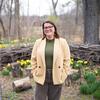What impact do you hope your work / art will have within your field of study and beyond?
I really hope the impact of my career is that whatever person, entity, community I come in contact with—my main goal is to really just help incite this biophilic love for nature. I want to incite that to people more and have them understand where it comes from so that there's a greater responsibility over the world around us. I just want to turn the lens back on to nature. When we're building a neighborhood, how do we respect existing trees? Just a mentality change in people. Which sounds really big. I don't know if that's possible. But I'm going to try.
What specific challenges has being in grad school helped you learn to face?
We all come from different backgrounds. And coming into it trying to learn CAD, Illustrator, InDesign, SketchUp—your mind is just constantly exploding with new information and it's incredibly intimidating. But the thing that's given us all sort of the sense of calm is having each other to lean on. So having no sort of judgment towards the learning process with one another has opened us all up to just feeling so comfortable.
What do you consider your community at Temple? How has this community impacted you, and how do you hope to impact this community?
My community is my cohort, really. We are all really tight-knit and all really supportive of each other. Beyond that, we all meet for ASLA meetings—American Society of Landscape Architects. I don’t think I would have been able to learn as much if I didn’t have them. I hope if people can learn something from me, it might be: we all feel awkward or uncomfortable when we're all new in a room, so just dive right in. Chances are everybody else around you is also nervous…so just move on from that feeling.
Do you have any mentors or people you look up to?
Nathan Havers—he started our first year, so we kind of grew into the program together. I know I work very well with mentorship, and he is a professor who I think really brings out the artist in me, and not just by creating physical things, but by thought. He just has a really great way of meeting a student where they're at as a person, and he has a way of helping you construct your best work without you even realizing it's happening.
What is one piece of advice you’d offer to a potential graduate student?
The only advice I can think of is if you're considering going to graduate school, whether it be to further your current degree or totally switch fields—I say just go for it. Time's going to pass anyway, and you might as well do the thing that makes you go outside of your comfort zone and really push yourself. That's what life's all about—learning new things and finding out who you are on all these different levels.


